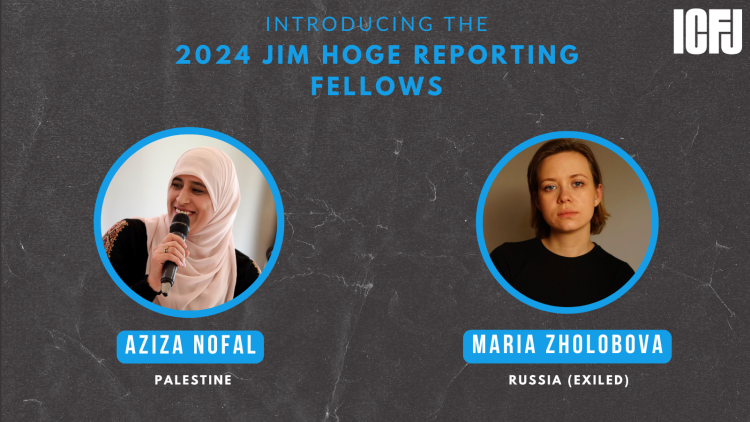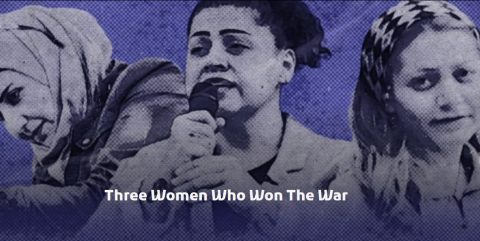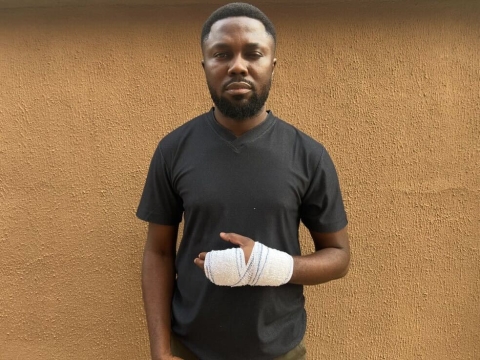As war and turmoil continue unabated in Ukraine and Palestine, the world relies on journalists to keep attention focused on the brutal conflicts and their effect on real people.
In honor of our late board chair Jim Hoge, ICFJ has just awarded two journalists fellowships to provide vital coverage of those conflicts. The 2024 Jim Hoge Reporting Fellows are Aziza Nofal, who reports from the West Bank for Al Jazeera and other outlets, and Maria Zholobova, a Russian journalist in exile who works for the investigative outlet IStories.

While we can’t provide details on their investigative projects yet for security reasons, they will hold leaders to account for decisions that are having a devastating impact on the lives of vulnerable people in the two conflict zones.
Aziza and Maria follow in the footsteps of our 2023 Jim Hoge Reporting Fellows. Each of them produced groundbreaking projects – and I am thrilled to tell you the results of those.
- Mais Katt (Syria and the Netherlands) produced a multimedia project, Women Who Won the War, a poignant look at three women who have documented abuses of the Assad regime and extremist groups against civilians, testified in international criminal courts, and told the stories of refugees and internally displaced people in northern Syria. These women have taken tremendous risks, and one of them has tragically disappeared. Mais had to reconstruct her story from interviews with relatives.
Publishing the project led Mais to launch a new outlet, also called Women Who Won the War, dedicated to creating space for women to tell their stories outside of the traditional lenses of wives, mothers and victims. It also offers support, training and guidance to women journalists operating in conflict zones, with a particular focus on the Middle East and North Africa.

- Philip Obaji (Nigeria) has been the world’s leading reporter exposing how Russian mercenaries commit rapes and murders in Africa, protecting corrupt leaders in exchange for access to natural resources that are funding Russia’s war in Ukraine. On his fellowship, he produced heartbreaking stories for the Daily Beast showing how Russia’s Wagner Group, even after the death of founder Yevgeny Prigozhin, massacred dozens of people in the Central African Republic to get access to a gold mine and raped hundreds of women and girls in areas under its control.
Philip’s latest story, published last month, details how he was abducted and beaten by CAR soldiers while interviewing miners for his project. That wasn’t all - on another occasion, he was detained by the rebel fighters opposing the CAR army and the Wagner Group. Despite all that, he got the stunning story proving the abuses by the Russians.

- Bárbara Poerner (Brazil) is a freelance journalist who focuses on the intersection of women's rights, climate justice and cultural issues. She produced a four-part docu-series, Monocultura da Energia (Monoculture of Energy), which explores the impacts of energy projects such as oil exploration, fracking and wind farms on Brazilian traditional communities, such as Indigenous people and those descended from enslaved Africans.
The series garnered widespread attention, with the first episode broadcast at COP28 in the United Arab Emirates in January during a panel focused on Brazil. Two episodes were shown at the Brazilian Congress in April, followed by a panel discussion with Bárbara, representatives of traditional communities and leaders from the Ministry of Mines and Energy. The panel focused on how the government needed to take into account the impact of energy projects on those communities.

We are thrilled to see how Jim Hoge’s legacy has had such an impact across the world – and we look forward to telling you about the latest fellowship projects when they are complete.